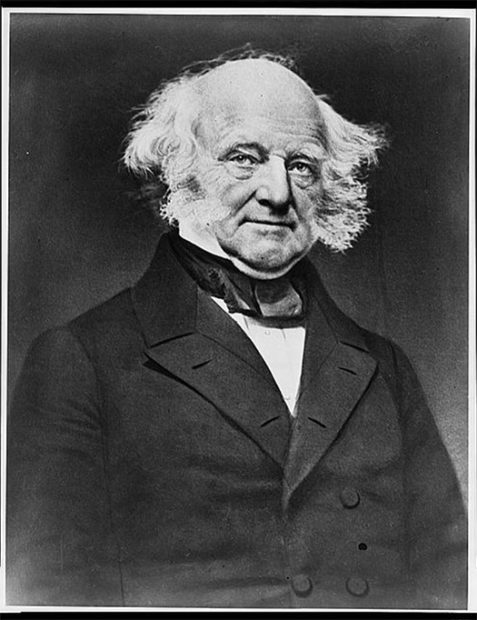“I must go into the Presidential chair the inflexible and uncompromising opponent of every attempt on the part of Congress to abolish slavery in the District of Columbia against the wishes of the slaveholding states, and also with a determination equally decided to resist the slightest interference with it in the states where it exists.”
–Inaugural Address, March 4, 1837
(Post of 12/5/2016; reposted 12/5/2023)

Martin Van Buren Eighth U.S. President Source: Library of Congress Prints and Photographs Division
OK –Literally.
Martin Van Buren, the eighth President of the United States, was born on December 5, 1782 in Kinderhook, New York, making him the first American president born a U.S. citizen. Van Buren was also known as “Old Kinderhook, or “OK,” the origin of that American expression.
Van Buren was also the first New Yorker elected President. He was a crafty political power broker who mastered the art of “machine politics” and helped bring New York into Andrew Jackson’s column in 1828. He became Jackson’s Secretary of State and later his vice president. He won the presidential election of 1836. But his presidency was tainted by the Panic of 1837, a deep economic depression that lasted seven years. He was defeated in 1840 by William Henry Harrison of the Whig Party.
Fast Facts:
•Van Buren was the first president not of English descent. Growing up in a Dutch-speaking household, he was also the only president who spoke English as a second language.
•As a young attorney, he became the protege of Aaron Burr. Due to a passing resemblance and their political and professional connections, it was rumored that he was Burr’s son, gossip thoroughly dismissed by historians.
•Elected Governor of New York in November 1828, Van Buren took the office on January 1, 1829 but resigned on March 12, 1829 to become secretary of state, making him the shortest tenured governor in New York history.
•During Van Buren’s administration, the removal of native Americans from the Southeast accelerated including the removal of the Cherokee on the “Trail of Tears.”
•The Congressional “gag rule” was passed during his presidency; the rule forbid any discussion of petitions relating to slavery, including banning slavery in Washington, D.C, as mentioned in Van Buren’s inaugural address above.
•Failing to win the Democratic nomination in 1844, Van Buren became the first president to run on a third party ticket when he joined the Free Soil Party as its candidate in 1848.
You can read more about his life at the Martin Van Buren Historical Site (National Parks Service) and at the Library of Congress.
And read more about Van Buren and his administration in Don’t Know Much About® the American Presidents